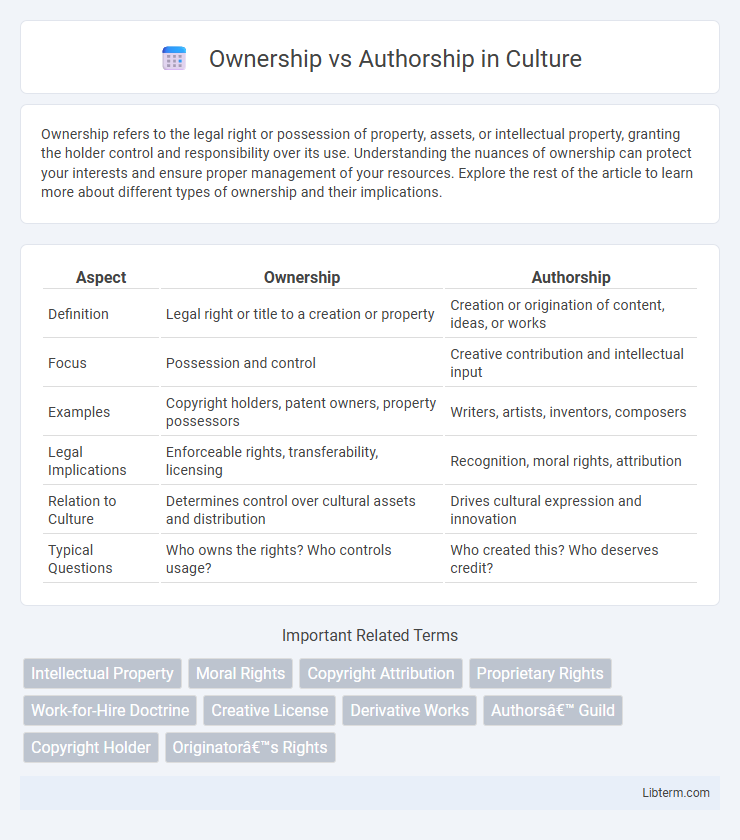Ownership refers to the legal right or possession of property, assets, or intellectual property, granting the holder control and responsibility over its use. Understanding the nuances of ownership can protect your interests and ensure proper management of your resources. Explore the rest of the article to learn more about different types of ownership and their implications.
Table of Comparison
| Aspect | Ownership | Authorship |
|---|---|---|
| Definition | Legal right or title to a creation or property | Creation or origination of content, ideas, or works |
| Focus | Possession and control | Creative contribution and intellectual input |
| Examples | Copyright holders, patent owners, property possessors | Writers, artists, inventors, composers |
| Legal Implications | Enforceable rights, transferability, licensing | Recognition, moral rights, attribution |
| Relation to Culture | Determines control over cultural assets and distribution | Drives cultural expression and innovation |
| Typical Questions | Who owns the rights? Who controls usage? | Who created this? Who deserves credit? |
Defining Ownership and Authorship
Ownership refers to the legal right or control over a work, granting the holder authority to use, distribute, or modify the material. Authorship identifies the original creator or originator responsible for producing the content or intellectual property. Distinguishing between ownership and authorship is critical for intellectual property rights, licensing agreements, and copyright enforcement.
Historical Context of Ownership and Authorship
Historical context reveals that ownership and authorship have evolved distinctly, with ownership traditionally linked to legal possession of property or intellectual rights, while authorship pertains to the original creation or creative contribution. In Medieval Europe, ownership rights were often controlled by feudal lords, whereas authorship gained recognition during the Renaissance with the rise of individual artistic and literary identity. The development of copyright laws in the 18th century further solidified ownership as a legal claim and authorship as a source of moral and economic rights.
Legal Distinctions: Ownership vs Authorship
Ownership refers to the legal rights and control over a work, including the ability to reproduce, distribute, and license it, while authorship identifies the individual who created the original content or work. Intellectual property laws, such as copyright, often separate these two concepts, granting authors moral rights to attribution and integrity regardless of ownership transfer. Understanding the distinction is crucial in contracts, as ownership can be assigned or transferred, but authorship remains tied to the creator for legal and ethical recognition.
Intellectual Property Rights
Ownership of intellectual property rights grants legal control and exclusive rights to use, distribute, and license the work, often held by the entity that finances or commissions the creation. Authorship refers to the individual or group that originally creates the content, holding moral rights such as attribution and integrity of the work. Distinctions between ownership and authorship are crucial in contracts and disputes, impacting rights to royalties, reproduction, and modifications under copyright law.
Copyright Implications
Ownership in copyright law typically refers to the legal entity or individual who holds the rights to a creative work, including reproduction, distribution, and derivative rights. Authorship, however, identifies the original creator responsible for the work's expression, which influences moral rights but does not always equate to ownership, especially in work-for-hire scenarios. Copyright implications arise when ownership and authorship diverge, affecting licensing agreements, infringement liability, and the enforcement of rights under statutes like the Copyright Act.
Roles and Responsibilities of Owners and Authors
Owners hold the ultimate authority and legal rights over a work, including decision-making on usage, distribution, and licensing, ensuring protection of intellectual property. Authors are responsible for creating original content, maintaining the integrity and authenticity of the work, and often contribute to revisions and updates. Clear delineation of these roles streamlines accountability and enforces proper attribution in creative and legal contexts.
Transfer of Ownership and Authorial Rights
Transfer of ownership involves the legal handover of a work's physical or digital copy, but it does not automatically include the transfer of authorial rights, which remain with the original creator unless explicitly assigned. Authorial rights encompass copyright, moral rights, and control over reproduction, distribution, and derivative works, protecting the creator's intellectual contributions. Clear agreements are essential to differentiate between ownership of the physical medium and the retention or transfer of these exclusive authorial rights.
Ethical Considerations in Attribution
Ethical considerations in attribution emphasize clear distinctions between ownership and authorship to ensure proper credit is given for intellectual contributions. Accurate authorship reflects genuine creative input and responsibility, while ownership pertains to legal rights over the work's use and distribution. Misattributing or conflating these roles can lead to disputes, undermine trust, and violate academic or professional integrity standards.
Impact on Creative Industries
Ownership establishes legal rights and control over creative works, directly influencing revenue streams and distribution in industries such as publishing, music, and film. Authorship, while recognizing the original creator's contributions, often faces challenges in attributing value and protecting moral rights when ownership is transferred or shared in collaborative projects. Clear distinctions between ownership and authorship rights are critical for fostering innovation, ensuring fair compensation, and maintaining ethical standards within the creative economy.
Future Trends in Ownership and Authorship
Future trends in ownership and authorship are increasingly shaped by blockchain technology and smart contracts, which facilitate transparent digital rights management and secure intellectual property transactions. Decentralized platforms empower creators with direct control over their work distribution, reducing intermediaries and enhancing revenue sharing models. Emerging legal frameworks are evolving to address the complexities of digital and collaborative content, ensuring clearer attribution and ownership in an interconnected creative economy.
Ownership Infographic

 libterm.com
libterm.com